
Americas troop involvement in the Vietnam War began in 1964 and ended in 1973. In those nine years, over 58,000 Americans died, most of them under the age of twenty-five. Nineteen- and twenty-year-olds serving in Vietnam were not yet old enough to vote at the start of the war but were old enough to die for their country more than 8,000 miles away from home. By 1968, the number of American troops in Vietnam reached a peak of 543,482. Over 40,000 American service members had already died, and the war, which had been justified as a means to stop the worldwide spread of Communism by supporting South Vietnam in its stand against the Communist Viet Cong soldiers of the North (who were backed by Russia and China), now seemed unwinnable to a majority of the American people.
President Lyndon Baines Johnson put a troop drawdown into effect and chose not to run for reelection in 1968, instead spending the remainder of his time in office overseeing the effort to end the war through a negotiated peace with the Communist North Vietnamese. Troop levels dropped to 475,200 in 1969 as Americans trained the South Vietnamese to fight their war against the Viet Cong, who refused to come to the negotiating table. President Richard Nixon asked Congress to institute a draft lottery system whereby young men who had previously had deferments that kept them from going to Vietnam if they were in college would be entered into the draft pool each year, determined by the number assigned to their birthdays. Local draft boards across the country retained the right to decide exemption or deferment status based on a questionnaire all eighteen-year-old males had to fill out when they registered for the draft. All registrants were listed as 1-Adraft-readyuntil or unless they received a deferment or an exemption. As the war waged on, and as draft boards had to meet their quotas for inductees, these deferments became more arbitrary, depending on how each draft board ruled on each registrants application for deferment or exemption, and the rulings could change as well, which left all young men over eighteen, including those in college, uncertain about their future.
Nixon widened the war with carpet-bombing campaigns even as he continued troop withdrawal. On March 18, 1970, the U.S. began bombing neutral Cambodia, a country next door to Vietnam and a safe harbor for North Vietnamese troops. This news became public on April 30, when Nixon appeared before the American people on television to announce the beginning of an incursion (not an invasion) for the purposes of rooting out Communist North Vietnamese strongholds in Cambodia and protecting the remaining U.S. troops in Vietnam. This strategy was met with strong and visceral disapproval by the American people, particularly by the young.
Across the country, students on college campuses protested, loudly and boldly and angrily, exercising their constitutional, First Amendment rights of freedom of speech, assembly, press, and petition. At Kent State University in Kent, Ohio, student protests were met with the Ohio National Guards occupation of the campus and, on May 4, 1970, the murder of four Kent State students and the wounding of nine others when National Guard troops opened fire on demonstrating students as well as on some who were observing or walking to class. This book chronicles those four days in May 1970 when America turned on its unarmed children, in their schoolyard, and killed them.

I aint marching anymore. Phil Ochs You are new here, and we dont want to scare you away, but we want you to know the truth, so we will start by telling you what is most important: They did not have to die. But they did die.
They were sacrificial lambs, coldly, deliberately slaughtered. No, they werentit was a mistake. A tragic mistake. It was calculated! Planned! They were lambs! It was a tragic mistake. You dont have the whole story. And you always think you do.
I know what I saw. I know what they did. I know that those kids will never wear tat sleeves or gauges or listen to Mtley Cre or watch Star Wars or read Harry Potter or talk on a cell phone or use a computer or play video games or realize the Vietnam War is over and their unwilling, unknowing, unplanned-for sacrifice helped it come to an end. Yes. Its a tragedy. And now there are other wars! More wars.
War after war after war. War is never over. Its over if we want it to be. War is never over. John Lennon said it was. War is over if you want it.
Its in a song he and Yoko wrote in 1971. Too late for Allison, Bill, Sandy, and Jeff to hear it. Are we going to argue again? Yes. We always argue when we speak of the killings. Lets try not to argue. Lets tell it the way we remember it, all of us.
Because, look, we have someone new here, someone new to listen to us. I see that. Hail, young friend you are a feast for heartsick eyes. I can tell, you are about the same age that Allison was. Allison and her flowers are better than bullets. Thats what she said to the National Guard soldiers, the day before they killed her.
I think our new friend looks like Bill. Bill was an Eagle Scout. Or SandyI loved Sandy. She was wearing a red sweater that day. Or maybe Jeffrey. Jeffrey went to Woodstock! And then, on May 4, 1970, less than a year later, he was shot through the mouth and killed instantly.
I loved Jeffrey so much. I loved them all. I did, too, of course. Nine were wounded. Dont forget them. Or us. Or us.
We were all wounded that day. Yes. We all bear the scars of that day. Our country bears the scars of that day. We are forever heartsick. Yes.
So lets tell the story one more time, for our new friend. Lets try not to argue. I can try not to argue, so long as you dont invite the others. The others will come. They always come when we remember. *I* disagree with you. *I* disagree with you.
We wont be able to stop them from coming. The ones who think those four deaths were justified. The ones who think more kids should have been shot. Killed. I hate them. There is no place for hate here.
Not anymore. I hate them. The ones who want us to forget they will come, too. The ones who tried to erase the fact that grown-up America killed its children in 1970 and never apologized for it. I hate them. Tell the story, then.
This is a place for remembrance. And for sharing what we remember so it wont happen again. But it WILL happen again. It always happens again. It doesnt have to. You start.
I promise not to argue until youve finished. You start. Ill try. But dont expect me to agree with you. I dont even like you. You dont have to like me.
Just tell our new friend what you remember. I like it better when you tell it and I disagree. Then I will start. Let me make room for our new friend. We dont want to scare you away, friend. Sit. Listen. Listen.
Make up your own mind. Open your heart. Here is what is most important: They did not have to die.

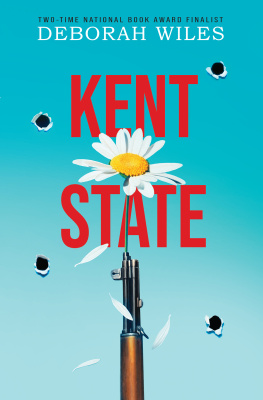
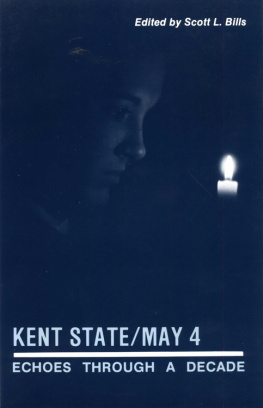
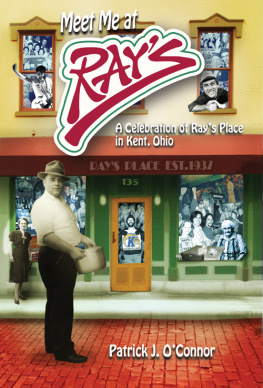
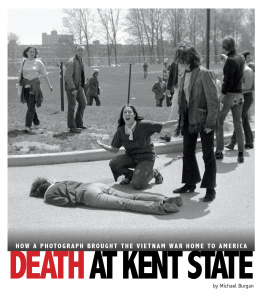

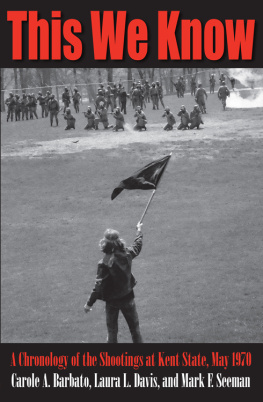
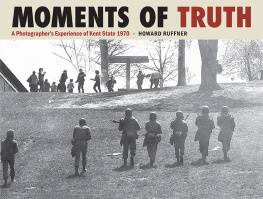
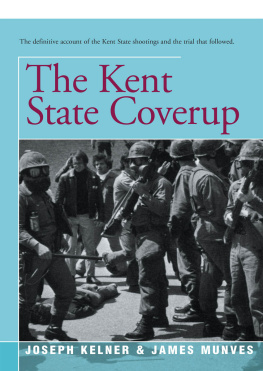
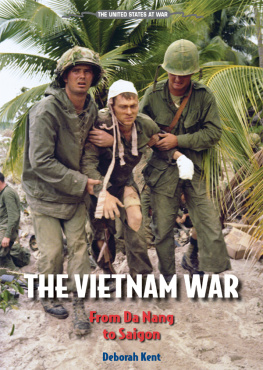
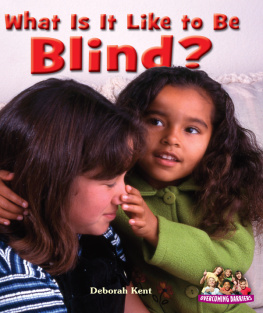

 For Allison, Jeff, Sandy, and Bill, for the shepherds of their stories, and for those who come next: the innocents and the activists, the questioners and the debaters, the voters and the proclaimers, the realists and the idealists, the truth-seekers, the young War. What is it good for? Edwin Starr
For Allison, Jeff, Sandy, and Bill, for the shepherds of their stories, and for those who come next: the innocents and the activists, the questioners and the debaters, the voters and the proclaimers, the realists and the idealists, the truth-seekers, the young War. What is it good for? Edwin Starr Americas troop involvement in the Vietnam War began in 1964 and ended in 1973. In those nine years, over 58,000 Americans died, most of them under the age of twenty-five. Nineteen- and twenty-year-olds serving in Vietnam were not yet old enough to vote at the start of the war but were old enough to die for their country more than 8,000 miles away from home. By 1968, the number of American troops in Vietnam reached a peak of 543,482. Over 40,000 American service members had already died, and the war, which had been justified as a means to stop the worldwide spread of Communism by supporting South Vietnam in its stand against the Communist Viet Cong soldiers of the North (who were backed by Russia and China), now seemed unwinnable to a majority of the American people.
Americas troop involvement in the Vietnam War began in 1964 and ended in 1973. In those nine years, over 58,000 Americans died, most of them under the age of twenty-five. Nineteen- and twenty-year-olds serving in Vietnam were not yet old enough to vote at the start of the war but were old enough to die for their country more than 8,000 miles away from home. By 1968, the number of American troops in Vietnam reached a peak of 543,482. Over 40,000 American service members had already died, and the war, which had been justified as a means to stop the worldwide spread of Communism by supporting South Vietnam in its stand against the Communist Viet Cong soldiers of the North (who were backed by Russia and China), now seemed unwinnable to a majority of the American people.  I aint marching anymore. Phil Ochs You are new here, and we dont want to scare you away, but we want you to know the truth, so we will start by telling you what is most important: They did not have to die. But they did die.
I aint marching anymore. Phil Ochs You are new here, and we dont want to scare you away, but we want you to know the truth, so we will start by telling you what is most important: They did not have to die. But they did die. 